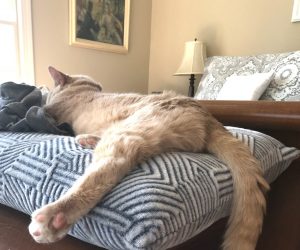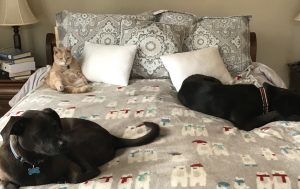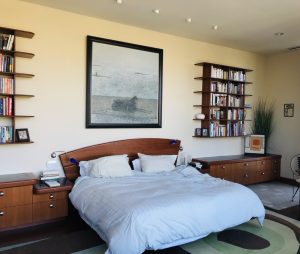 Sleep is the ultimate way to recover and it now has well-deserved research showing its importance to health and longevity. Discover 16 tips that will assist you in getting quality sleep.
Sleep is the ultimate way to recover and it now has well-deserved research showing its importance to health and longevity. Discover 16 tips that will assist you in getting quality sleep.
1. Recognize the Importance of Sleep - We all know how we feel when we are sleep deprived. The consequences can include forgetfulness, fatigue, increased accidents, a suppressed immune system and more. Lots of research has been conducted in recent years on this topic. We know that our brain has a housekeeping department called the glial cells. It cleans up toxins while we sleep and files memories to name a few of its many tasks. Studies have shown that a gene that controls glial cell activity is more active after a period of sleep deprivation. Another downside is that sleep deprivation reduces the amount of glucose that the brain receives; therefore, we might crave sugary foods.
Your takeaway: Schedule sleep in when you’ve got lots of personal and professional projects. Don’t sacrifice it!
2. Make Time for Vitamin D - It’s all about your circadian rhythm (our biological clock)! Light signals your body’s master gland, the hypothalamus, and other organs to know what time it is. Natural sun exposure triggers the body to produce daytime hormones and regulate our biological clock. Melatonin is a hormone that sets us up for good sleep conditions and is produced during the day and is impacted by light exposure. More exposure to sunlight during the day helps create quality sleep. Make sure you limit light exposure in the evening as not to disrupt your biological clock into thinking it’s still daytime.
Your takeaway: Get sunlight exposure during the day, but particularly between the hours of 6:00 and 8:30am.
3. Give Yourself a Caffeine Curfew - Caffeine is a stimulant to the nervous system but it comes with consequences. Limit caffeine consumption (from coffee, tea, chocolate) within 6-8 hours before bed. I personally cut it off at noon. Let’s look at caffeine works. Neurons in your brain are firing and creating a neurotransmitter byproduct called adenosine. The body is looking for adenosine in your body. Once they reach a certain level in the brain and spinal cord, the body starts to move you in sleep mode. The problem with caffeine is that it’s tricky. It’s is structurally similar to adenosine and fits into the receptor sites in the body that adenosine is trying to move into. When that happens, adenosine doesn’t find its home and you don’t get to sleep.
Your takeaway: Set a caffeine curfew. Know that caffeine has a half-life of 8 hours (example 200mg of caffeine becomes 100mg in 8 hours, and 50mg 8 hours after that). It hangs around in your system for a long-time so be careful when consuming caffeine. Learn more with a nutritionist.
4. Avoid Screens Before Bed - Avoid light and this includes blue light from electronic devices such as computers, phones, etc. in the evening. This light interrupts the melatonin secretion and makes it more difficult to get to sleep.
Your takeaway: Limit device use 90 minutes before sleep. Enjoy a “real” book instead.
5. Body Temperature - Have you ever noticed that you slept better when it’s a cool temperature? It’s true. Thermoregulation greatly impacts our sleep cycles. When it’s time to get some “shuteye” there is an automatic drop in body temperature to facilitate the transition. If it’s too warm, it can stressful on your body to reach that ideal state for slumber. The ideal environmental temperature for sleep is around 68◦ but it can be a bit cooler as well, but not too cold so you’re distracted in falling asleep.
Your takeaway: Take a warm bath or shower about an hour to 2 hours prior to bedtime. The increased core body temperature from the warmth will fall and level out a little cooler right before bed.
6. Time Your Slumber - If you aren’t a shift worker, there is a magic window of time between 10:00pm and 2:00am when hormone secretion and recovery is at its optimum. After 10pm your body experiences a natural high as melatonin is secreted. Melatonin secretion is fine if you’re already asleep. The problem is if you’re awake, the energy that comes from melatonin will make it more difficult to get to sleep. Don’t fight sleep! If you feel tired, go to bed. Don’t wait and get that second wind. Once that alert state happens, it makes getting to sleep a lot harder.
Your takeaway: Get to sleep during the right window of time. Did you know that sleep cycles are ~90 minutes in length? What does that mean? Sleep cycles are your body’s natural rise and fall of sleep depth. By waking up at the top of a cycle, you wake up feeling refreshed and alert and that’s usually when you wake up in the middle of the night to go to the bathroom. If you wake up at the bottom (about 45 minutes in), you usually wake up feeling groggy. Set your alarm according to this so you wake up refreshed.
7. Magnesium - Magnesium is my best friend and my family jokes that I should have a sticker on my car that reads – Got Magnesium? It’s an amazing anti-stress mineral. It’s involved in over 300 enzymatic processes from helping balance blood sugar, assisting with blood pressure, optimizing circulation, relaxing muscles, reducing pain and simply calming the nervous system. It tends to get depleted pretty quickly because it’s in high demand and many people are magnesium deficient. How does it work for sleep? If you reduce stress on the body, it sets you up for getting a good night’s sleep. You can purchase magnesium oils, gels and use in a foot bath, regular bath or apply directly to the body. Just know to start out with the oil on a small part of the body first. If you’re low in magnesium, it will sting a bit. Your body is telling you what it needs! Try it on your lower leg first and see how it feels (and not directly after you shave your legs). You can always place it on your feet, let it dry and then apply socks – it won’t sting on your feet.
Your takeaway: Magnesium is amazing. Topical application gets into your system quicker than what you ingest via food or supplement. Topical magnesium mixed with lotion makes it a less tacky/sticky infusion. Magnesium is also great for relieving headaches, so I keep a little bottle of oil or gel in your desk.
8. Cultivate a Sleep Sanctuary - Don’t bring work to bed! Make sure the bedroom gets fresh air. Having plants  in your room or house is a great way of recycling the old air.
in your room or house is a great way of recycling the old air.
Your takeaway: Get at least one house plant for your bedroom (snake plant and ivy are great) and keep work out of the bedroom!
9. Black Out the Light - You naturally sleep better in a dark environment! Any light from artificial streetlights, night lights is not advisable and can significantly decrease the quality of your sleep. Eye masks are good but can’t assist blocking everything. Black out curtains are helpful and placing black electric tape over house alarm buttons that may be in your bedroom is advisable.
Your takeaway: Black out curtains are a great way of getting rid of light pollution. Remove light up devices and get a dim alarm clock.
10. Working Out - When you exercise, you’re breaking down the body and rebuilding. When you sleep, your body goes through a restorative stage and repairs the damaged tissue. By working out, you’re forcing your body to secrete more beneficial hormones to build you up better than before. Work out in the morning is best as evening workouts don’t allow enough time for your bodies core temperature to drop before sleep. However, a workout is better than not working out at all. Just know that the best hormonal response comes from lifting weights, not cardio. This releases more of the anabolic hormones that make you look, feel and sleep better.
Your takeaway: Lift weights at least two days a week. Refer to postings with the SAS Recreation and Fitness Center trainers for more information.
11. Technology - Modern technology is great but has messed up our circadian rhythm. Many people are sitting in bed and sleeping next to gadgets. Studies have shown that individuals who have devices by their bedside take longer to reach the deeper stages of sleep and don’t spend as long in this stage. These devices also emit harmful electric and magnetic fields known as EMFs. EMFs from common electronic devices have been linked to leukemia, brain tumors and breast cancer. It’s not healthy to sleep next to your devices. Keep them in a separate room and away from your head.
Your takeaway: Use a good old-fashioned alarm clock to wake you up.
12. Lose Weight - Being overweight can result in lower quality sleep according to some recent studies. It can cause stress to your internal organs, nervous system and disrupts your endorphin system (which produces beneficial hormones like melatonin). Overweight individuals are more sensitive to cortisol (anti-sleep hormone) secretion after eating a meal and this lowers your insulin sensitivity and increases blood pressure and inflammation. Be sure to get a good macronutrient balance of fats, protein and carbs. Speak with a nutritionist at the HCC.
Your takeaway: Focus on whole foods and avoid processed food. Learn more here.
13. Impact of Alcohol - When you drink before sleep, you fall asleep faster but don’t get into the deeper sleep stages and your brain and body won’t be able to fully rejuvenate. Of course, if you’re waking up to go to the bathroom this is even more disruptive.
Your takeaway: If drinking, wrap it with some time to spare before sleep. Ideally 4 hours. Also, make sure you don’t drink more than the recommended allowance.
14. Calm Your Inner Chatter - It often happens…we jump into bed and then start thinking about everything and anything. It’s the monkey mind leaping from one vine to the next. This inner chatter can keep you awake and makes getting to sleep more difficult. Meditation can help. It enhances the release of the “feel-good” hormones and endorphins, lowers stress and inflammation in the body. It can help improve your focus, creativity, memory, imagination, productivity, performance and attention. It literally changes the shape of the brain (plasticity) and increases the size of your alpha waves where creativity, memory, learning and concentration are heightened.
Your takeaway: Meditating in the morning is beneficial and allows you to get a clear mindset and intention for the day. Added bonus: meditate a few times a day and it can be short-time, mindful sessions. Need some assistance? Start with a guided meditation.
15. Wake Early - Getting up early is a wonderful way to start the day and get sunlight in the morning that helps set your biological clock. Going to sleep early and waking up early helps your body sync with the earth’s natural circadian rhythm which is more restorative than trying to sleep when the sun is up. Did you know that morning people tend to have character traits such as happiness, optimism and satisfaction more than those who aren’t considered morning people?
Your takeaway: Go to bed within 30 minutes of the same time every night. This includes weekends.
 16. Create a Sleep Ritual - We are creatures of habit and our brain loves patterns and schedules. This allows more space to focus on other things. Nurture your ritual and set the scene for dim lights, maybe a bedroom diffuser of lavender essential oil, reading an actual book, journaling and thinking of things you’re grateful for before your head hits the pillow. Learn more.
16. Create a Sleep Ritual - We are creatures of habit and our brain loves patterns and schedules. This allows more space to focus on other things. Nurture your ritual and set the scene for dim lights, maybe a bedroom diffuser of lavender essential oil, reading an actual book, journaling and thinking of things you’re grateful for before your head hits the pillow. Learn more.
Your takeaway: Create a ritual but don’t get concerned about getting everything perfect every night. Life happens and your ritual may be interrupted. Just let it be and adapt.
For more information on sleep, check out these books - Why We Sleep, The Circadian Code, Sleep Smarter just to name a few. There are many wonderful resources and research.

3 Comments
Great tips! When I have trouble falling asleep, I count backward from 100. It helps to calm that inner chatter.
Absolutely Jorie! That's a great tip. Thanks for sharing.
Awesome write up! Book-ending the day with exposure to sunlight in the morning, and a shower a bit before bed - the latter is definitely something I will be trying the next few weeks to see how that works!